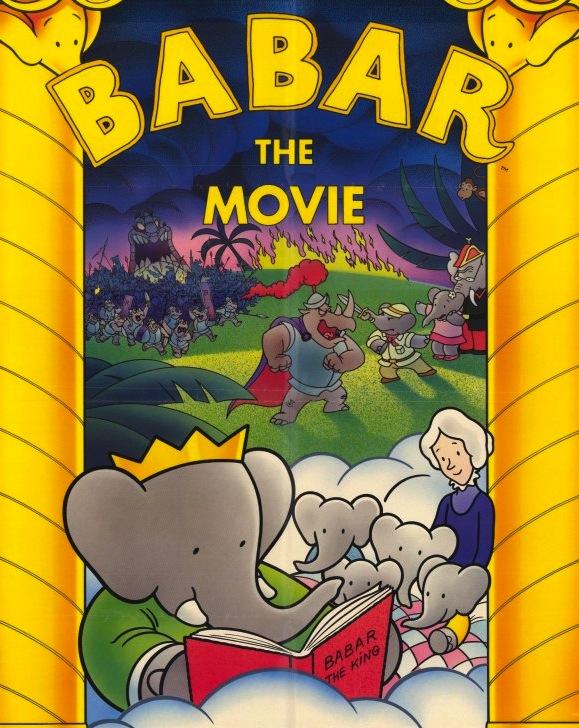Friday, July 28, 1989.
BABAR: THE MOVIE. Co-written by Peter Sauder, J.S. Smith, John de Klein and Raymond Jafelice, from a story by Peter Sauder, Patrick Loubert and Michael Hirsh. Based on characters created by Jean de Brunhoff and Laurent de Brunhoff. Music by Milan Kymlicka. Co-written and directed by Alan Bunce. Running time: 70 minutes. Rated General entertainment.
THE MONKEY IS GRATEFUL. Babar (voice of Gavin Magrath), child-king of the elephants, has just saved him from a hungry crocodile.
"You do something for me," says Zephir (John Stocker), "I do something for you. That's the Law of the Jungle."
The crocodile is grateful. With his monkey-buddy safe on the river bank, Babar removes the stick holding the reptile's mouth open.
"The Law of the Jungle says I owe you," says the croc (Ray Landry).
Filmgoers have less reason to be grateful. Despite the endorsement of Babar creator Jean de Brunhoff's son and heir Laurent, Babar: the Movie is yet another cutesy-crass cartoon from Canada's TV-oriented Nelvana Ltd.
Though "based on characters created by Jean and Laurent de Brunhoff," this Babar needed five screenwriters — Peter Sauder, J.D. Smith, John de Klein, Raymond Jafelice and Alan Bunce — to adapt a story by Sauder and Nelvana's founding partners, Patrick Loubert and Michael Hirsh.
And what have they to show for it? Babar and the Temple of Doom.
Told in flashback, the film has King Babar (Gordon Pinsent) relating the tale of Elephantland's war with the rhinos.
Warned by his friend Celeste (Sarah Polley) that the nasty rhinoceros King Rataxes (Charles Kerr) is attacking elephant villages, young Babar sets out to help.
Notice how the script committee is punching up the story for the big screen.
Generations of kids subjected to de Brunhoff's naif picture books by well-meaning librarians know that the war resulted from a cruel joke. Celeste's rambunctious brother Arthur "tied a firecracker to (Rataxes's) tail" while the rhino was enjoying "a quiet siesta."
Jean de Brunhoff, a proper French papa offering instruction to his own children, was making a point — actions have consequences. In the original, he goes on to say that "real war is no joke, and many of the elephants (are) wounded."
Nelvana's point is more market-oriented. In its version, Rataxes is a power-mad empire-builder, a villain in conquistador-like armour razing elephant villages and enslaving their inhabitants.
Perhaps we should be grateful for small mercies. The voice performances are all professional and the musical numbers, employing the talents of Toronto-based a cappella group The Nylons, are suitably perky.
Though the animation ranges from indifferent to adequate, at least it's not embarrassing. But . . . wait just a minute.
I'm tired of being grateful for small mercies.
Nelvana, while piously giving lip service to "good family entertainment" and the Disney legacy, has become the Hanna-Barbera of the North.
A pioneer in the animation-as-advertisement approach to films, Nelvana grew to be the world's fifth-largest cartoon factory by producing simpering schlock like The Care Bears.
Its Babar comes complete with derivative action sequences and vaudeville turns — its crocodile has an Australian accent, for pity's sake. It's a travesty.
* * *
BABAR BEFORE: But . . . But, you say, I remember seeing Babar on television 20 years ago.You did, too.
Though Laurent de Brunhoff isn't mentioning it in his current interviews, in 1968 he collaborated with former UPA animator Bill Melendez on The Story of Babar, the Little Elephant, a TV cartoon special for NBC that featured Peter Ustinov as its narrator.
Best known for his Peanuts specials, Melendez went on to direct two animated features based on the Charles Schulz characters: A Boy Named Charlie Brown (1969) and Snoopy, Come Home (1972).
The above is a restored version of a Province review by Michael Walsh originally published in 1989. For additional information on this archived material, please visit my FAQ.
Afterword: Trophy hunting has been a headline issue since the July 1, 2015 death of a Zimbabwean lion named Cecil. The subject of an Oxford University study and a major tourist attraction, Cecil enjoyed protected status in the Hwange National Park until the day that a would-be "big-game hunter" lured him from his sanctuary to shoot and kill him. The incident became an international outrage, drawing attention to the threatened survival of such creatures as lions, rhinos and elephants. World Elephant Day, celebrated on August 12 since 2012, was founded by B.C. environmental activist and documentary filmmaker Patricia Sims, in cooperation with Thailand's Elephant Reintroduction Foundation. Sims's Victoria-based CanazWest Pictures is currently involved in post-production of her 90-minute non-fiction feature When Elephants Were Young. Scheduled for release this September (2015), its cast includes William Shatner as the story's narrator.
Babar, as suggested in the above review, originally spoke French. Written and illustrated by Jean de Brunhoff, Histoire de Babar (1931) was translated into English in 1933. It was the beginning a series, taken over by his son Laurent in 1948, that now includes more than 40 titles. Not surprisingly, Babar's early adventures reflected the French colonial experience between the two world wars. Fleeing the jungle after the death of his mother, the young elephant is befriended by a kindly Old Lady, who provides him with a proper education and the wherewithal to return to his own land, where he becomes king. First adapted for the screen in the 1968 TV special mentioned above, Babar also has been the subject of a six-season Franco-Canadian TV series (1989-1991; 2000) produced by the Quebec-based Nelvana animation studios. More recently, Nelvana and its various partners created a computer-generated (3D) cartoon series, Babar and the Adventures of Badou (2010-2013). In the 1989 feature and through both TV series, Canadian actor Gordon Pinsent has provided Babar with his voice.
